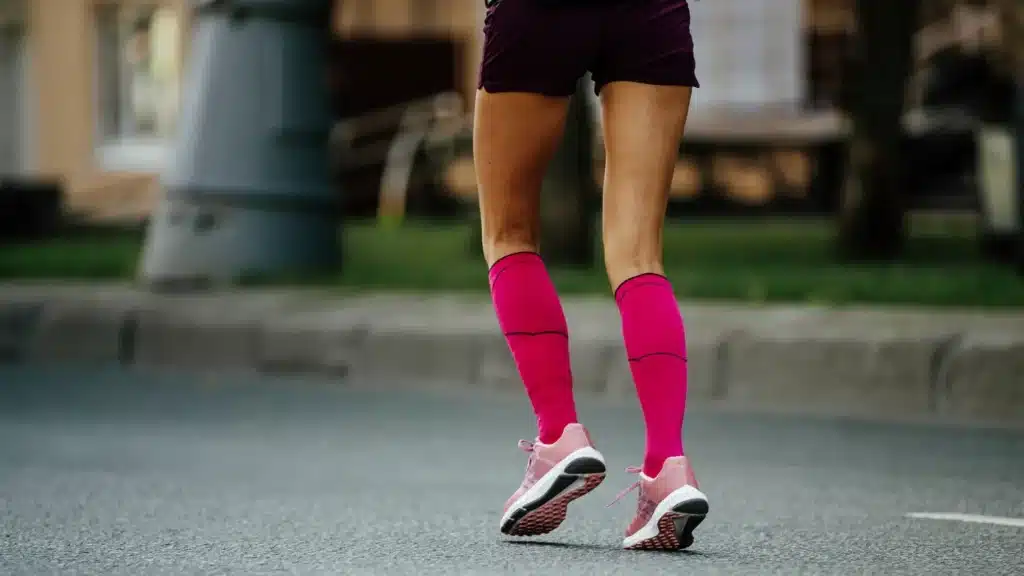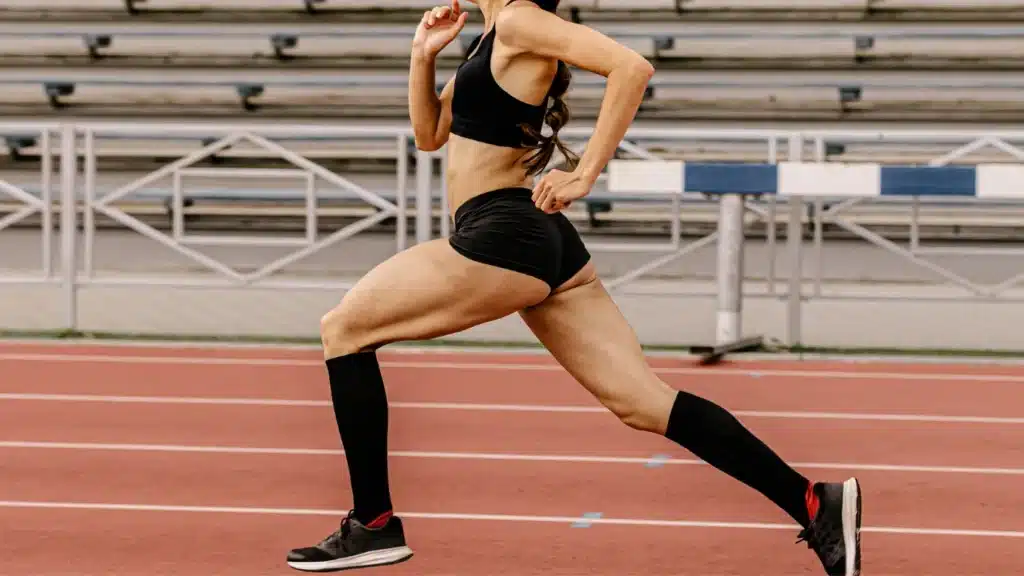While compression stockings help improve circulation and provide relief for various health conditions, athletes are now discovering the numerous benefits they offer for performance and recovery. Compression socks have become an essential tool for athletes, not just for their healing properties but also for improving endurance, minimizing fatigue, and speeding up recovery. Whether you’re training for a marathon or cycling long distances, compression socks can make a noticeable difference in how you feel before, during, and after physical exertion.
At LMC Footcare, we offer high-quality compression socks designed to enhance foot health and overall well-being. In this blog, we’ll explore how compression socks can give athletes the edge they need to perform better and recover faster.
What Are Compression Socks?
Compression socks are elastic garments that apply gentle pressure to the legs and feet. The pressure is strongest at the ankle and gradually decreases as it moves up the leg. This “graduated compression” helps boost circulation by encouraging blood flow back to the heart, reducing swelling and fatigue, and promoting muscle recovery.
Athletes, especially those who engage in endurance sports like running, cycling, and even weight training, can benefit from compression socks because they support the body’s circulation and reduce the strain that can lead to muscle damage and soreness.
The Benefits of Compression Socks for Athletes
- Improved Circulation
The primary benefit of compression socks is their ability to enhance blood circulation. During intense physical activity, muscles demand more oxygen and nutrients, which is made possible by the increased blood flow. By wearing compression socks, athletes can help ensure that blood flows efficiently back to the heart, preventing swelling and improving overall oxygenation of muscles. - Faster Recovery
After an intense workout, muscles can become swollen and fatigued. Compression socks help reduce this by improving circulation and facilitating the removal of lactic acid and other metabolic waste from muscles. This makes recovery quicker and helps athletes return to training sooner, with less muscle soreness or discomfort. - Reduced Muscle Fatigue
Compression socks reduce the vibration of muscles during exercise, which can cause fatigue. By stabilizing the muscles, particularly in the calves and shins, compression socks prevent excessive strain, allowing athletes to endure longer workouts without feeling overly fatigued or uncomfortable. - Injury Prevention
The supportive structure of compression socks helps prevent common injuries like strains and sprains. By offering stability to the muscles and joints, especially in the lower legs, compression socks reduce the risk of overuse injuries during training and competition. - Enhanced Performance
Many athletes find that wearing compression socks during exercise leads to improved performance. The increased blood flow and reduced muscle vibration can provide a significant boost to endurance, helping athletes push harder and longer during their training or competition.

When Should Athletes Wear Compression Socks?
- During Exercise
Compression socks can be worn during exercise to help with circulation, reduce muscle fatigue, and improve overall performance. They are especially beneficial for endurance athletes such as runners and cyclists, but they can be worn during any type of intense activity. - After Exercise
Post-exercise, compression socks can help reduce swelling and soreness in the muscles. The compression helps flush out metabolic waste and promotes faster recovery, so athletes can get back to their routines quicker and with less discomfort. - During Travel
Athletes who travel frequently for competitions or training can benefit from wearing compression socks during long flights or car rides. Prolonged sitting can lead to swelling in the legs and feet, and compression socks help reduce this risk while promoting better circulation. - For Injury Recovery
Compression socks are also useful during injury recovery. Whether recovering from a sprain or a muscle strain, wearing compression socks can help reduce swelling, prevent further injury, and promote faster healing by enhancing blood flow to the affected area.
Choosing the Right Compression Socks for Athletes
When selecting compression socks, athletes should consider the level of compression needed for their specific activities. Compression socks come in various levels, from mild compression (15-20 mmHg) to higher levels (20-30 mmHg or 30-40 mmHg). The higher the compression level, the greater the pressure on the legs, which is useful for serious athletic endeavours or post-injury recovery.
In addition to compression strength, athletes should look for socks that are breathable, moisture-wicking, and comfortable for long periods of wear. Materials like nylon, elastane, and spandex are commonly used in high-quality compression socks, as they provide the necessary stretch and flexibility.
Not sure which compression level is right for you? Speak to one of our footcare specialists (Chiropodists) to find the perfect fit for your needs.
Compression Socks vs. Regular Socks
Unlike regular socks, which are designed for comfort, compression socks are specifically engineered to provide therapeutic benefits. Regular socks don’t offer the targeted pressure required to boost circulation and support muscle recovery. Compression socks use elastic materials to provide a snug fit and apply pressure at specific points, which helps enhance blood flow and reduce swelling.
Compression socks are also made from fabrics that allow the skin to breathe, making them ideal for long hours of physical activity. Traditional socks, on the other hand, often lack this capability and can become uncomfortable or cause blisters after prolonged wear.
FAQs About Compression Socks for Athletes
1. Do compression socks actually work for athletes?
Yes, compression socks are highly effective for athletes. They enhance circulation, reduce muscle fatigue, and speed up recovery. Many athletes report feeling less sore and recovering faster after workouts or competitions when they wear compression socks.
2. How long should I wear compression socks for recovery?
For optimal recovery, athletes can wear compression socks for several hours after a workout or competition. However, the ideal duration depends on the intensity of the activity and personal comfort.
3. Can compression socks prevent injuries?
Compression socks can help prevent injuries by stabilizing the muscles and reducing the risk of strain or sprain. They also improve circulation, which helps keep muscles hydrated and less prone to cramping.
4. Can I wear compression socks during intense exercise?
Yes, compression socks are safe to wear during exercise. In fact, they can improve your performance by reducing muscle vibration, increasing circulation, and providing support to your legs during physical activity.
5. Are there any downsides to wearing compression socks?
While compression socks are generally safe, they may not be suitable for everyone. If you have certain medical conditions, such as severe peripheral artery disease, it’s important to consult with a healthcare provider before using compression socks. It’s also important to ensure you’re using the correct size and compression level to avoid discomfort.
Have questions about which compression socks are right for you? Speak with one of our footcare specialists (Chiropodists) to get personalized guidance.
Conclusion
Compression socks are an invaluable tool for athletes looking to improve their performance and accelerate their recovery. By enhancing circulation, reducing muscle fatigue, and providing injury prevention, compression socks offer numerous benefits that can give athletes the edge they need to perform better and recover faster.
At LMC Footcare, we offer a range of compression socks and other footcare products to support your athletic goals. Whether you’re in Vaughan, Bayview/Midtown Toronto, or elsewhere in Ontario, our team is here to help you stay healthy and perform at your peak.
If you’re ready to boost your performance and speed up recovery, visit us today to find the perfect compression socks for your needs.
















